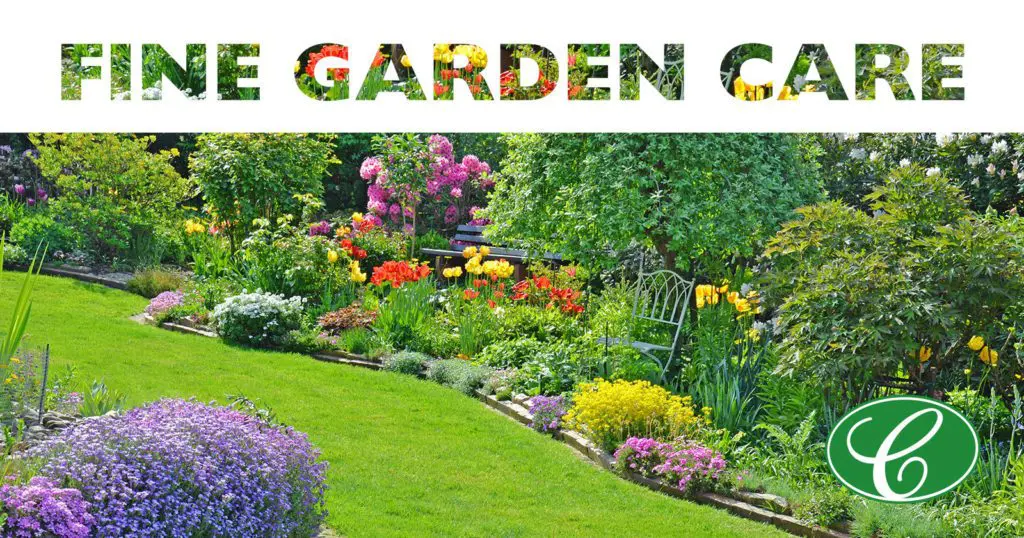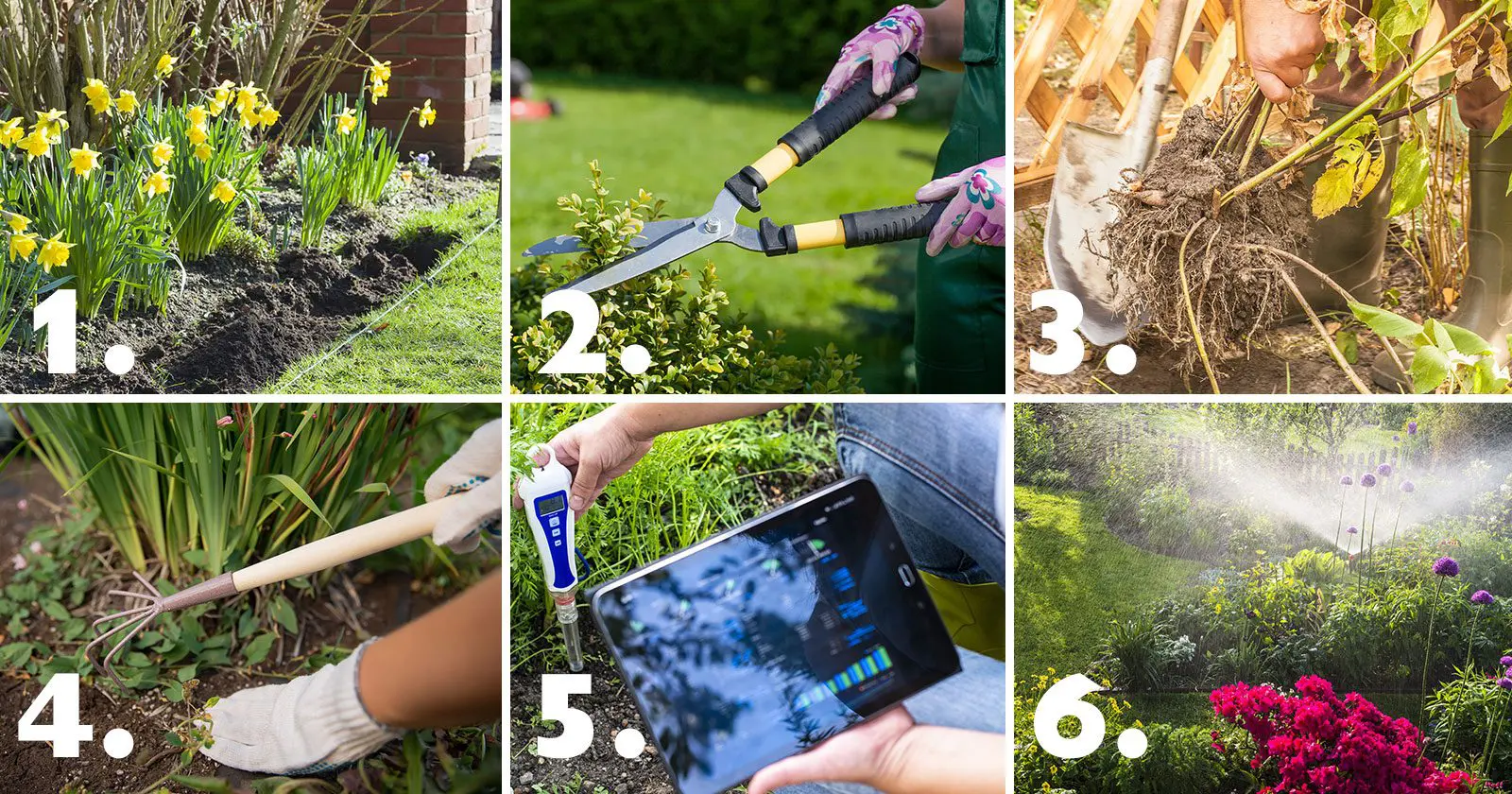Create Your Outdoor Oasis!
Start Your Risk-Free Project Estimate with Cole Landscaping Today.

What do you know about Fine Garden Care? A Fine Gardener’s singular goal is to vigilantly care for the soil, plants, and design compositions viewed through the lens of a dynamic natural system. This means that we must look at the garden with the eyes of a trainer and a caretaker. Consequently, we ask, “How can we make this perform better, look better, and be healthier?”
For Fine Garden Care, our goal is to nurture both plants and soil to achieve high performance over time. Primarily, that performance is connected to ecological health. However, it is also tethered to the presentation of the garden. It is also important that the presentation pleases the garden owner. Since beauty is in the eye of the beholder, it lives on a continuum of expression stretching from formal order to wild order. It is up to the Fine Gardener and landowner to determine where on the continuum the landscape will live.
To this end, the Fine Gardener will make changes and subtle shifts within gardens, keeping the original design intent in mind. While doing so, they will keep a firm watch on the evolution of plants and how that affects the space and its uses over time.
Cole Landscape specializes in partnered Fine Gardening Landscape Care with homeowners. Partnering enables us to supply care at the level best suited for you and your landscape. It also enables us to dovetail our specialties with our other landscape services that we are currently providing for you.
In our family of clients, we have active gardeners who spend many hours in their own landscapes each month. And we have garden enthusiasts who would like to spend more time in their landscape, but life does not allow them the time needed to do the necessary work. We also have clients who appreciate the value of their landscape and all its gardens have to offer but have no interest in doing the gardening tasks themselves.
There is no right or wrong answer for the best approach – simply a matter of different lifestyles and needs. By using the information shared here, we hope you can start to get a feel for what your land management needs are. Let us help tend to them with of our Fine Gardening Care blocks of time.

Fine Gardening requires the regular consideration of the following six areas of management. Do not leave any of them out or else your landscape risks deterioration into chaos. Here is what you can expect from our team during your time block.
Cut lawn edges to demarcate planting beds and lawn areas; keep the lawn from spreading into what it considers empty spaces. In some cases, perennials and groundcovers want to return the favor and spread into lawn spaces. The goal is a healthy cohabitation without invasion so that there is a neat edge with a well-shaped flow that draws your eye through the landscape in a gentle and pleasing way.
We prune trees and shrubs at the appropriate time in their growth cycles. Not all plants can or should be pruned at the same time, so be aware that spring, summer, and fall pruning needs are different. There are times when we will suggest that plants be pruned in the wintertime as well. Additionally, all plant types are not pruned in the same way. Understanding horticultural differences is critical in getting this job done right.
Gardens mature and age over time at different paces. As a consequence, plants may need varying attention over the seasons as they mature and respond to seasonal fluctuations. Light pruning and deadheading of herbaceous plants (like perennials) are necessary as these plants move through their normal flowering cycle. Older, more mature plants may need heavier-handed attention if they become too big or are no longer performing well in a particular location. Dividing and transplanting perennials that have outgrown their current space can make more room in the old location and provide an additional plants to utilize in other, open areas. Moving out shrubs to make more room and fill new spaces can be extremely effective in getting more performance out of an area and the plants in that garden. Most often we perform this kind of work in the spring and fall.
Weeding is a necessary “evil” that should not be avoided. Good bed management also means managing moss and overly aggressive perennials and woody plants that are seeding themselves in the landscape. Primarily, the goal is to keep the garden managed. You need to prevent undesirable plants from getting a foothold in the soil or, worse, entangled in the root systems of the desirable plants. If you skip weeding, you ensure that the problem will increase. This is because weeds also have a flowering and seed setting cycle (just like the desirable plants). When they are left unchecked, those weeds repopulate the soil with more seeds to germinate in the next season and many seasons thereafter. It takes only one seeding to create weeds for several years to come.
Soils deficient in organic matter, minerals, and/or nutrients should be treated to improve conditions for plants. It may be necessary to apply lime applications in the fall to improve the vitality and performance of ornamental garden areas. We recommend soil testing to understand the soil chemistry more fully. As as result we can determine appropriate fertilization programs as well as more steps for soil remediation. Simply adding fertilizer on a yearly basis is not only ineffective, but it can also be costly. We suggest organic compost for use with all plantings/transplanting. We also recommend organic mulches – simple undyed bark and/or leaf mold – as a follow-up to all the above work. Balanced soils help reduce or eliminate moss, yellowed leaves, insect predation, and at times even helps reduce weeds. Most important, healthy soils have a better chance of supporting plants through times of drought.
Proper hydration is one of the key ingredients for a healthy landscape. First of all, proper hydration promotes healthy soil. Secondly, it supports the right plants in the right places. Thirdly, it helps provide adequate acclimation time for new plants. Plants should only be moved if the homeowner is able to reliably monitor and water them. It should be noted that irrigation systems are not adequate for watering transplants. They also should not be set and left unchecked – this is a root cause of much of our seasonal water shortages. It is important to be aware of factors that may impede proper hydration, such as competition from trees, overcrowded plantings, and areas over-exposed to the elements, to name a few. If this is the case, a change in plant care strategy may be necessary.
For each person who owns a parcel of land – of any size – the trick is to determine what you can or cannot do on your own. First, factor in your time, skills, and desire as the primary step to understanding your landscape care needs. Next, you can start to identify what level of outside help you would need to create the landscape you’ve always imagined. Simply schedule a free consultation with our fine Garden Care Expert. We will develop a strategic partnership that secures a surefire way to ‘have it all.’
If you have never worked with a Fine Gardener, we encourage you to give it a try. Scheduling just one day of professional care can makes a significant difference that will be sure to delight. Once you see what our team of professional Fine Gardeners can accomplish in just one small slice of your landscape, we can discuss developing a custom Fine Gardening care program that will transform your everyday landscape into an exceptional landscape that is tailored perfectly to you.
Schedule your free Fine Garden care session today and see how a Fine Garden Care specialist can make your landscape come to life!

Meet Matthew–
Matt started his career at Cole in 2023, and has Associates of Science Degree in Business, & . Massachusetts Certified Horticulturist (MCH)
with over 10 years of experience working in the Landscape industry with a focus on Garden and Tree Care.
Matt’s wide variety of personal, academic, and professional experiences have contributed much to his interests in the landscape industry. Client satisfaction is Matt’s main focus. Matt is interested in how intentionally designed outdoor spaces impact our quality of life. Providing clients with a beautifully maintained outdoor living space is Matt’s main goal. That space should align with their expressed/felt needs, meet their budget, be aesthetically pleasing, and responsive to their site’s existing conditions.
Matt believes that communication is key. He consistently develops and maintains positive relationships with commercial customers by managing the acquisition and delivery of products, and services. He’s passionate about performing on-site visits with clients to determine what can be improved to make the property more aesthetically appealing. Whether it be small changes or larger landscaping upgrades, he excels at every level. Matt provides ongoing customer service and maintains expert knowledge of his clients and their property’s needs.
Start Your Risk-Free Project Estimate with Cole Landscaping Today.
Mon-Sat: 8:00am – 4:00pm
Sun: Closed
